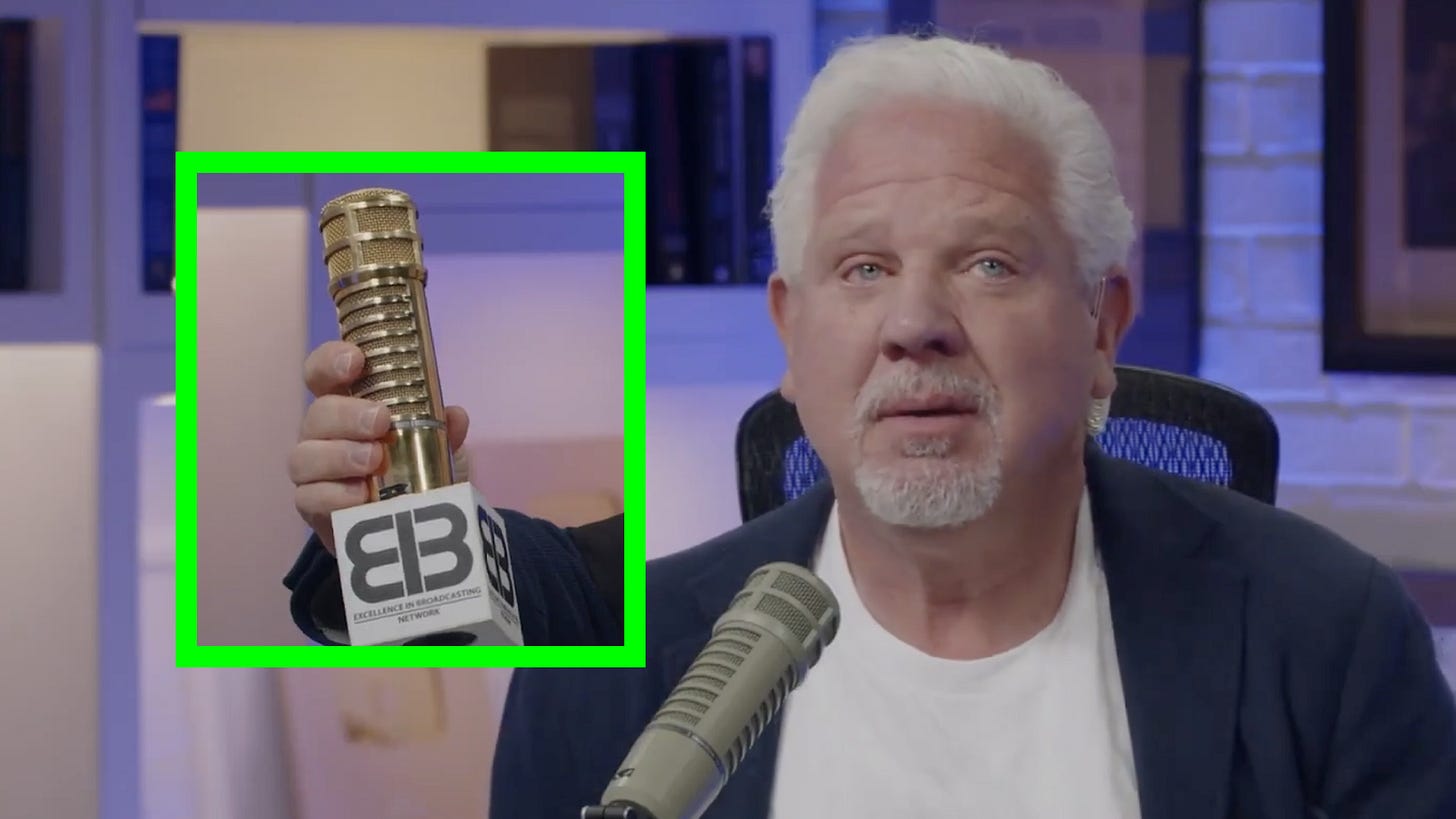Glenn Beck Breaks Down Honoring Charlie Kirk—Placing Rush Limbaugh’s Golden Mic on His Desk
Guest-hosting The Charlie Kirk Show, Beck shared the story he never got to tell Charlie in person.
This will surely go down as one of the greatest honors for the family and friends of Charlie Kirk.
Today, Glenn Beck stepped in to guest-host The Charlie Kirk Show—and from the second the cameras rolled, he knew it was going to be emotional.
What he didn’t expect was just how powerful the moment would become.
As the show opened, Beck sat in Charlie’s studio—and immediately broke down.
He didn’t even make it through his first sentence before his voice cracked and the tears started forming for his late friend.
“Hello, my name is Glenn Beck and I am—”
He paused, overcome with emotion.
“—a friend of Charlie Kirk’s. You may not know who I am, but one thing I am known for is, my emotions, and I think we’re going to need a tarp today.”
You could hear it in his voice—this was raw. This was real.
Off to his side, an empty green chair sat silently on set—the one Charlie always used. Beck glanced over at it.
That chair hit him the hardest.
“I knew this was going to be—difficult—but to sit in the studio—right next to his chair, is more difficult than I imagined.”
He took a moment to steady himself, then leaned forward.
“I want to talk to you a little bit about the future, but I want to talk to you a little bit about my friend as well.”
“I knew Charlie when he was young. I first met him, I think, he was 17 years old.”
Beck lowered his head and placed a hand under his chin, staring off for a moment.
“He was amazing. He was so well read. So smart, so clear.”
“I thought, this is an amazing man.”
And from there, Glenn Beck delivered one of the most personal, most heartfelt tributes to Charlie Kirk that anyone has heard since his murder last week.
Beck went on to say he always knew there was something different about Charlie—something big.
But then he paused.
He wanted to share a story. One that no one had heard before.
One he never got the chance to tell Charlie himself.
“I want to share a story—that I’ve never shared before and I so regret that we ran out of time.”
His voice trembled. You could tell this one hurt.
“It’s a story that I had hoped to tell Charlie myself in the next couple of months.”
He leaned back and looked away as he recalled their first real conversation.
“When I first met Charlie—and this is the kind of guy he was—he was so gracious. When I first met him, he was young.”
“And I said, so, what do you want to do? What is it you want? What? What do you want to do?”
Beck smiled a little through the tears.
“So gracious, he said, ‘I want to be you. I want to do what you do.’”
Then Beck clarified what Charlie really meant:
“Let me translate: I want to be Rush Limbaugh. He didn’t want to be me. He wanted to be Rush Limbaugh. He wanted to be one of the, as Rush said, radio’s greatest of all time.”
“And I remember thinking, well, kid, maybe someday—because I think you have it.”
At that point, Beck reached down and opened a metal case he’d brought with him to the studio.
“I brought something with me today that I thought was appropriate while I did the show, that I would sit in front of Charlie’s microphone. It was given to me after the death of Rush Limbaugh by his wife.”
He held it up and looked into the camera.
“It is Rush’s golden microphone.”
And then, with tears in his eyes, he gently placed it down—in front of the empty chair where Charlie once sat.
“I think it’s appropriate that it sits in front of Charlie’s microphone.”
Beck took a breath, collected himself, and continued.
“What I would have said to Charlie was, you were thinking too small.”
He explained how even he still wants to be Rush someday. That’s always been the goal—for himself.
“I want to be Rush Limbaugh someday.”
But when it came to Charlie, that dream wasn’t big enough.
“I’m a broadcaster. Rush was a broadcaster. But Charlie was a broadcaster and a narrowcaster.”
And then he laid it out—everything Charlie was beyond just a voice over the radio.
“Charlie was a pastor and a priest.”
“And listening to the way he could argue and think differently, he was a rabbi as well, and one of the best.”
“He was a political organizer.”
“He was a political think tank himself.”
“He was a compassionate friend.”
And then Beck looked directly into the camera and delivered the line that will live on forever.
“He surpassed Rush Limbaugh—by miles.”
With that, Beck ended the segment and cut to commercial. And for those who watched it unfold in real time—it’s a moment they’ll never forget.
Your monthly subscription goes further than you think. Thank you so much for your support.


